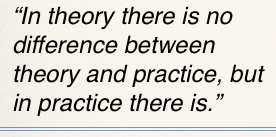 What is theory?
What is theory?
Mogan Niss in his paper The concept and role of theory in mathematics education offers this definition of theory:
A theory is a system of concepts and claims with certain properties, namely
- The theory consists of an organised network of concepts (including ideas, notions, distinctions, terms etc.) and claims about some extensive domain, or a class of domains, of objects, situations and phenomena.
- In the theory, the concepts are linked in a connected hierarchy (oftentimes of a logical or proto-logical nature), in which a certain set of concepts, taken to be basic, are used as building blocks in the formation of the other concepts in the hierarchy.
- In the theory, the claims are either basic hypotheses, assumptions, or axioms, taken as fundamental (i.e. not subject to discussion within the boundaries of the theory itself), or statements obtained from the fundamental claims by means of formal or material (by “material” we mean experiential or experimental) derivation (including reasoning).
What are the theories put to use in mathematics education?
Niss: To begin with, four general observations pertaining to this question should be kept in mind.
- Firstly, there is no such thing as a well-established unified “theory of mathematics education” which is supported by the majority of mathematics education researchers. On the contrary, different groups of researchers represent different schools of thought, some of which appear to be mutually incompatible if not outright contradictory. It is not likely that we shall get a unified theory of mathematics education in a foreseeable future, if ever.
- The second observation is that many mathematics education researchers relate their work to explicitly invoked theories borrowed from other fields (or at least from authors who belong to other fields), and often do so in rather eclectic or vague ways. Only rarely are theories “homegrown” within mathematics education itself.
- Thirdly, much discussion and debate in mathematics education research takes the shape of “fights” with and between theories. This may be potentially fruitful to the extent competing theories offer different perspectives on the same thing, whereas it is potentially futile, if not destructive, if the theories deal with different things and therefore are only competing in the superficial sense that “my topic object of study is more important than yours”.
- Finally, the fourth observation is that quite a few mathematics education researchers do not explicitly invoke or employ any theory at all in their work. Many researchers who actually do invoke a theory in their publications do not seem to go beyond the mere invocation.
In other words, some theoretical framework may be referred to in the beginning or in the end of a paper without having any presence or bearing on what happens between the beginning and the end.
What should we strive at in theory building in mathematics education?
Niss: Imagine that there existed a full-fledged theory of mathematics education. What would it look like, and what minimum requirements would it have to fulfil? In order for it to be comprehensive enough to be worth its name, it would have to contain at least the following of sub-theories, each accounting for essential traits of mathematics education:
- a sub-theory of mathematics as a discipline and a subject in all its dimensions, including is nature and role in society and culture;
- a sub-theory of individuals’ affective notions, experiences, emotions, attitudes, and perspectives with regard to their actual and potential encounters with mathematics; a sub-theory of individuals’ cognitive notions, beliefs, experiences, and perceptions with regard to their actual and potential encounters with mathematics, and the outcomes thereof;
- a sub-theory of the teaching of mathematics seen within all its institutional, societal, national, international, cultural and historical contexts;
- a sub-theory of teachers of mathematics, individually and as communities, including their personal and educational backgrounds and professional identities and development.
